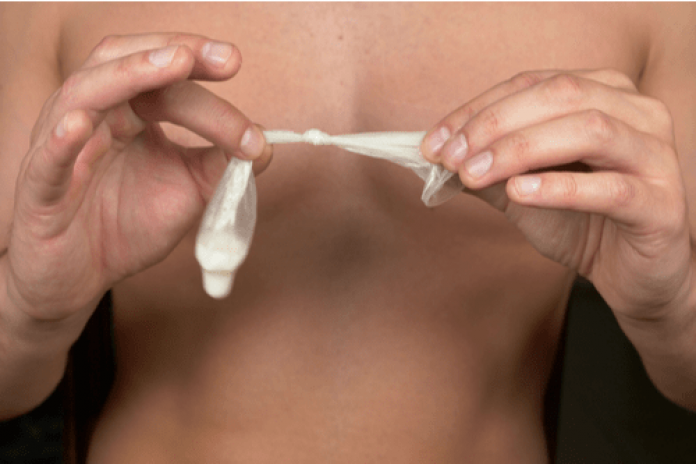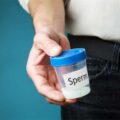Semen and sperm are two different things, but they are closely related. Semen is a fluid that is released from the penis during ejaculation, while sperm are the tiny reproductive cells that are contained within the semen. In this article, we will explore the characteristics and functions of both semen and sperm.
Semen
Semen is a complex mixture of fluids that are released from the penis during ejaculation. It is composed of several different components, including:
- Sperm: Sperm are the microscopic cells that are responsible for fertilizing an egg. They are produced in the testicles and stored in the epididymis until they are released during ejaculation.
- Prostatic fluid: The prostate gland produces a fluid that makes up a significant portion of semen. This fluid contains enzymes, zinc, and other substances that help to nourish and protect the sperm.
- Seminal vesicle fluid: The seminal vesicles produce a fluid that makes up most of the volume of semen. This fluid contains fructose, amino acids, and other substances that provide energy for the sperm.
- Bulbourethral gland fluid: The bulbourethral glands produce a fluid that is released during sexual arousal. This fluid helps to neutralize any acidity in the urethra and lubricate the penis.
Semen is typically a white or grayish color, and it has a slightly alkaline pH. It has a distinctive smell that is often described as musky or chlorine-like.
Semen serves several important functions in the reproductive process. It helps to nourish and protect the sperm, and it provides a medium for the sperm to travel through during ejaculation. Semen also helps to neutralize the acidic environment of the vagina, which can be harmful to the sperm.
Sperm
Sperm are the tiny reproductive cells that are contained within semen. They are produced in the testicles and stored in the epididymis until they are released during ejaculation.
Sperm are microscopic in size, typically measuring only about 0.002 inches in length. They are composed of three main parts:
- Head: The head of the sperm contains the genetic material (DNA) that is necessary for fertilization.
- Midpiece: The midpiece of the sperm contains mitochondria, which provide energy for the sperm to swim.
- Tail: The tail of the sperm is a long, whip-like structure that propels the sperm forward.
Sperm are produced in the testicles through a process called spermatogenesis. This process takes approximately 74 days to complete, and it produces millions of new sperm each day.
The number of sperm in semen can vary widely depending on a variety of factors, including age, health, and sexual activity. On average, a healthy adult male will produce approximately 1.5 to 5 milliliters of semen per ejaculation, and each milliliter of semen may contain anywhere from 20 to 150 million sperm.
It’s important to note that the number of sperm in semen does not necessarily correlate with fertility, as other factors such as sperm motility and morphology also play important roles in the ability to fertilize an egg.
Sperm are capable of surviving inside the female reproductive tract for up to five days. During this time, they swim through the cervix and into the fallopian tubes, where they may fertilize an egg if one is present.
What does healthy sperm smell like?
Healthy sperm does not have a distinct smell. In fact, sperm typically has a slightly salty or chlorine-like smell that is not particularly strong or unpleasant. If you notice a foul or strong odor coming from your semen or genitals, it could be a sign of an underlying medical condition or poor hygiene.
Does Sperm Smell When It Dies?
When semen dries or is exposed to air, the fluid portion of the semen evaporates, leaving behind the proteins and other substances that were dissolved in it. As a result, the semen may have a different odor when it is no longer fresh.
However, sperm itself does not have a distinct odor, and it is not known to produce an odor when it dies. Sperm is a microscopic organism that is contained within semen, and its odor is typically masked by the other substances present in semen.
When sperm is outside the body, it is exposed to different environmental conditions and undergoes various changes over time. Here are some things that can happen to sperm outside the body:
- Drying out: When semen dries or is exposed to air, the fluid portion of the semen evaporates, leaving behind the proteins and other substances that were dissolved in it. As a result, the semen may have a different appearance and consistency when it is no longer fresh.
- Decreased motility: Sperm are designed to swim through a liquid medium, and when they are exposed to air or other substances, their motility can be affected. Sperm that are no longer motile are less likely to be able to fertilize an egg.
- Decreased viability: Sperm are also sensitive to changes in temperature and pH, and exposure to harsh environmental conditions can reduce their viability. Sperm that are no longer viable are not able to fertilize an egg.
- Loss of genetic material: The head of the sperm contains the genetic material (DNA) that is necessary for fertilization. Exposure to certain environmental factors, such as heat or radiation, can damage the DNA and make it less likely that the sperm will be able to fertilize an egg.
- Inactivation: Sperm can be inactivated by exposure to certain chemicals or substances, such as chlorine in swimming pools or certain lubricants.
It is important to note that while sperm can survive for a short time outside the body under certain conditions, they are much more likely to be able to fertilize an egg if they are deposited directly into the female reproductive tract during sexual intercourse.
It is also important to note that any changes in the odor of semen or discharge may be a sign of an underlying medical condition, such as an infection. If you are experiencing unusual symptoms or odors, it is recommended to speak with a healthcare provider for evaluation and treatment.
How long does sperm smell last?
Sperm doesn’t typically have a noticeable or long-lasting smell. However, if there is an odor present, it may be related to other factors such as poor hygiene, infection, or certain medical conditions. If you have concerns about a persistent odor, it’s recommended to speak with a healthcare professional.
What does healthy sperm smell like?
Healthy sperm does not have a distinct smell. In fact, sperm typically has a slightly salty or chlorine-like smell that is not particularly strong or unpleasant. If you notice a foul or strong odor coming from your semen or genitals, it could be a sign of an underlying medical condition or poor hygiene. It’s important to speak with a healthcare provider if you have concerns about the smell or any other changes in your semen or genitals.
What causes fishy smelling sperm?
A fishy odor from sperm is not normal and could be a sign of an underlying medical condition. One possible cause of fishy smelling sperm is a bacterial infection such as bacterial vaginosis or a sexually transmitted infection like gonorrhea. These infections can cause an imbalance in the normal bacteria in the genital area, resulting in a fishy odor. Other factors that can contribute to a fishy odor include poor hygiene, a diet high in sulfur-rich foods, and certain medications. If you are experiencing a fishy odor from your sperm or genitals, it is important to speak with a healthcare provider for an evaluation and appropriate treatment.
How long does sperm smell last on clothes?
Sperm, like most bodily fluids, can leave a noticeable odor on clothes or other fabrics. The duration of the smell depends on various factors such as the type of fabric, the amount of sperm, and the environmental conditions such as humidity and temperature. In general, the smell of sperm can linger on clothes for several hours to a few days. To remove the odor, it’s recommended to wash the clothes using a detergent that contains enzymes or vinegar. Avoid using hot water as it can cause the protein in the sperm to coagulate and set into the fabric. If the smell persists, it’s best to seek professional cleaning services.
How does a man’s sperm affect a woman body ?
Semen, the fluid that carries the sperm, contains various compounds that can affect a woman’s body. The sperm cells themselves do not have a significant impact, but the other components in semen can interact with the female reproductive system. For example, semen contains hormones and neurotransmitters such as oxytocin, serotonin, and cortisol, which can affect the woman’s mood and emotions. These compounds can potentially contribute to feelings of intimacy and bonding, which can enhance the sexual experience and improve the relationship between partners.
When the sperm enters the woman’s reproductive tract, it can also have an impact on her immune system. The woman’s immune system recognizes the sperm as a foreign substance and can produce antibodies against it. These antibodies can help protect the woman’s body from certain sexually transmitted infections by neutralizing the pathogens that may be present in the semen. However, in some cases, these antibodies can also interfere with the ability of the sperm to fertilize an egg, leading to infertility.
Finally, the alkaline pH of semen can affect the environment of the vagina. The vagina normally has an acidic pH to prevent the growth of harmful bacteria and yeast. The alkaline semen can temporarily raise the pH, which can make the environment more hospitable to sperm but can also disrupt the natural balance of the vaginal flora. This disruption can potentially increase the risk of infections such as bacterial vaginosis or yeast infections.






